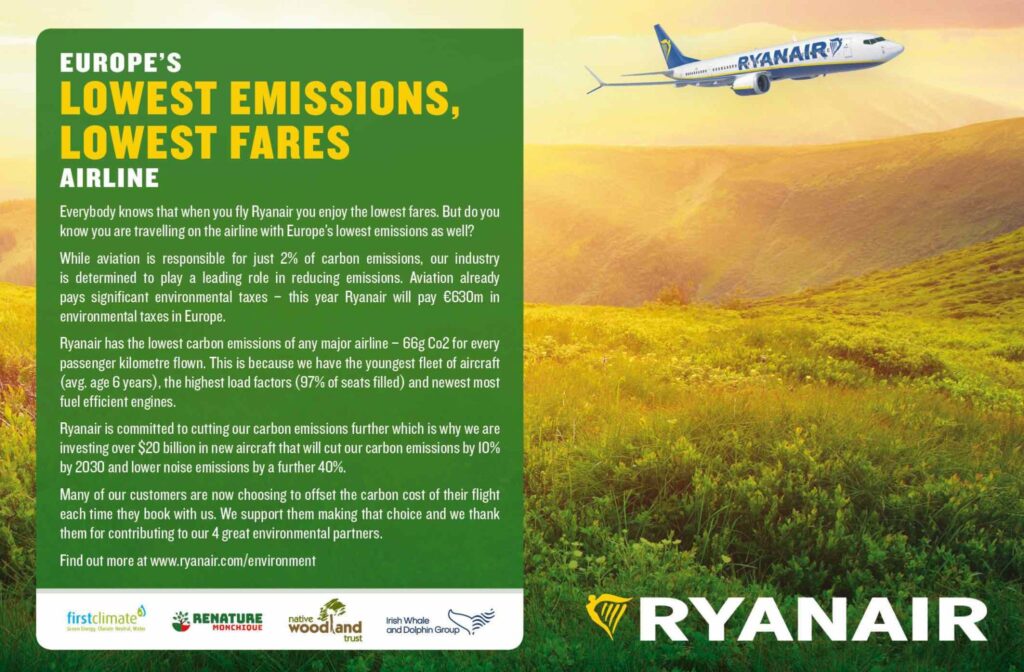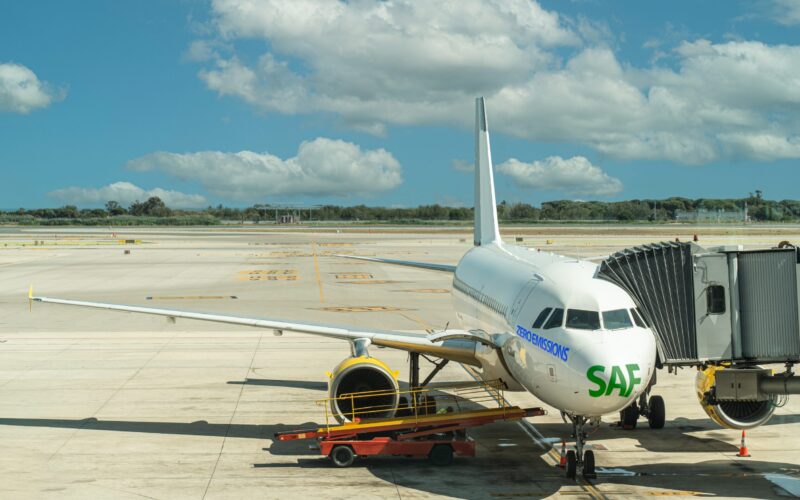The effects of climate change are becoming increasingly visible. Weather phenomena such as intense storms, rising sea levels, and heatwaves continue to make headlines.
In the past few months alone, there have been reports of wildfires in the Greek islands, flooding in Canada, record-breaking temperatures in Europe and the United States.
The need for more sustainable travel has turned into a demand. One study has found that 50% of global travelers admit recent news about climate change has influenced their travel behavior, and 81% citing sustainability as an important factor when planning a trip.
The industry’s significant carbon footprint has highlighted an urgency to make travel more sustainable.
Being a critical part of the global travel industry, the aviation sector responded to the growing demand for more sustainable travel, with campaigns showcasing biofuels, electric planes, and carbon offset schemes.
While the publicized journey towards ‘greener’ skies may look reassuring in marketing brochures, are these sustainability claims genuine, or merely ‘greenwashing’?
Green or ‘greenwashing?
The term ‘greenwashing’ was first introduced to the public by environmentalist Jay Westerveld in a 1986 essay criticizing a hotel chain policy to reduce towel consumption.
“Wash my towels please, just don’t greenwash me,” he noted, adding that the policy was not part of a wider sustainability policy, but a bid to save money.
The term is a combination of “green,” symbolizing environmental consciousness, and “whitewashing,” which is used to signal an attempt to stop people from finding out the true facts about a situation.
More recently it entered the public consciousness when it was directed at companies accused of misleading consumers by claiming products or services are ‘environmentally friendly’ when they are not.
This deceptive technique has increasingly found a home among a number of different sectors, and overstated sustainability claims have become a part of marketing strategies for numerous corporations.
For many environmentalists, the aviation industry stands as a prime example of ‘greenwashing’.
While aviation accounted for just over 2% of global carbon emissions in 2022, aircraft engines emit other substances, including soot, water vapor, sulfur, and nitrous oxides, all of which have substantial impacts on the upper atmosphere.
These emissions result in phenomena such as persistent contrails and are estimated to be around three times worse than the impact of CO2 alone, according to the European Union Aviation Safety Agency (EASA).
Under growing pressure to mitigate its environmental impact, the industry has committed to achieving carbon neutrality by 2050.
While many aviation organizations and carriers have begun to launch so-called ‘green’ initiatives, they have often been met with accusations of ‘greenwashing’.
Greater emphasis on sustainable aviation fuel
A number of airlines have prioritized the partial use of Sustainable Aviation Fuel (SAF) in their commercial flights, including British Airways, Jet Blue, Lufthansa, Scandinavian Airlines, Virgin Australia, and Virgin Atlantic.
“Despite the crisis in global aviation, it is vital for our future that we continue to address climate change and we remain focused on playing our part to reduce the impact we have on the planet,” Sean Doyle, British Airways’ CEO said while announcing the company’s biofuels initiative on February 2, 2021.
“For the last 100 years we have connected Britain with the world and the world with Britain, and to ensure our success for the next 100, we must do this sustainably,” Doyle added.
While airlines actively advertise the use of SAF as a major step towards reducing carbon emissions, these claims often neglect to consider the full lifecycle emissions of biofuels.
Research published by the Royal Society in 2022 found that while SAF has the potential to reduce greenhouse gas emissions, it might not meet stringent emission targets.
According to the Centre for Aviation (CAPA), by the end of June 2023, airlines had collectively operated just under 499,000 flights powered by SAF.
Moreover, the gains could be offset by environmental issues like acidification, eutrophication, increased water use, deforestation, and biodiversity loss.
The Royal Society research also warned that, at least for now, there is “no clear or single net-zero alternative to jet fuel”.
Industry shift towards electric aircraft
The aviation industry is enthusiastic about electric aircraft as a key part of the solution to achieving zero emissions. Companies might even excessively highlight their investment in future technologies, such as electric or hydrogen-powered planes, giving an inflated impression of a company’s environmental commitment.
Norway has announced it wants to make all short-haul flights electric by 2040 and three prototypes of the electric Heart ES-30 are slated to take off for their first test flight in 2026.
However, 80% of the aviation industry’s emissions come from passenger flights longer than 1,500 kilometers but larger electric aircraft, capable of longer flights, are not expected to be commercially viable until 2050.
“Even assuming huge advances in battery technology, with batteries that are 30 times more efficient and ‘energy-dense’ than they are today, it would only be possible to fly an A320 airliner for a fifth of its range with just half of its payload,” Airbus’s chief technology officer Grazia Vittadini said in July 2019.
While some airlines also use electric technology for more fuel-efficient planes, their projected efficiency improvement is expected to only reach up to 30% by 2050, per Greenpeace’s estimates.
Carbon offset programs: solution or distraction?
Airlines also began to offer customers the option of purchasing carbon offsets to compensate for the emissions generated by their flights. While this might seem like a good way to counteract the environmental impact, these schemes can be misleading and place the responsibility on the individual rather than the company.
Low-cost air carrier Ryanair introduced carbon offsetting schemes in July 2021, such as a “Carbon Calculator” and a “Partial Contribution” option, offering passengers an avenue to offset their flight emissions.
Nevertheless, in January 2023, the low-cost air carrier had to revise its carbon offset scheme after the Netherlands Authorities for Consumers and Markets (ACM) found its sustainability claims to be misleading.
The changes included clarifying that carbon offsetting does not inherently make flying more sustainable, providing explicit calculations for carbon emissions being offset, and offering more transparency about the projects funded by carbon offset compensations.
“Businesses must be honest and clear about the sustainability claims they make. Even with CO2 compensation schemes, flying remains a highly polluting way of traveling. Airlines may offer CO2 compensation schemes, but they cannot give the impression that CO2 compensation will make flying sustainable,” said Edwin van Houten, director of the Netherlands ACM’s Consumer Department.
The ACM also criticized Ryanair for suggesting that flying with the airline was considerably more sustainable, which could unfairly influence consumer choice. However, the low-cost air carrier still insists on referring to itself as the “greenest and cleanest airline in Europe”.

Pushback against ‘greenwashing’
In March 2023, the European Commission (EC) adopted a proposal for a Green Claims Directive (GCD). The directive is designed to regulate the way companies substantiate and present environmental claims, which could help shield consumers from misleading advertisements and create uniformity in ‘green’ marketing.
Under the GCD, on June 22, 2023, several consumer organizations across Europe, led by Testaankoop in Belgium and the European Consumer Organization (BEUC), accused 17 airlines of ‘greenwashing’. The airlines under scrutiny include big names like Air France-KLM, Lufthansa, and Wizz Air.
The organizations are asking for a detailed investigation into the green claims of these companies, and calling for refunds for passengers who paid extra thinking they were choosing a more ‘environmentally friendly’ flight.
“Airlines must stop giving consumers the impression that they are choosing a sustainable mode of transportation,” Laura Clays, spokesperson for Testaankoop said in a statement issued at the time. “Instead, to reduce emissions, it is essential to steer consumers toward more sustainable modes of transportation.”
Additionally, in their latest annual reports, several US-based S&P 500 companies, including BlackRock, United Airlines, and Phillips 66, have addressed the potential risks of ‘greenwashing’ as a response to growing investor and regulatory scrutiny around corporations’ environmental, social, and governance practices.
Can aviation go from ‘greenwashing’ to ‘green flying’?
The aviation industry is expected to triple in size by 2050. This growth could inevitably lead to a greater environmental impact. In the face of such enormous projections, the need for truly sustainable practices becomes not just desirable, but vital.
Stricter monitoring of the sustainability claims within the aviation sector could serve as the motivation needed to propel the industry towards a ‘greener’ future.
Holding airlines accountable will encourage them to shift from empty ‘green’ promises towards the meaningful adoption and development of more sustainable technologies and practices.
However, it is also important to acknowledge there is unlikely to be a single, one-size-fits-all solution to the aviation industry’s impact on the environment. Instead, it will require a combination of multiple approaches and technologies.
New technologies and schemes will need to be part of a much larger and more comprehensive strategy that includes efficiency improvements in aircraft and airport operations, regulatory measures to manage demand for air travel, and the promotion of alternative modes of transport where possible.
The onus is on aviation to rise to the challenge and make the concept of greener flying a possibility rather than simply a catchy marketing slogan.

